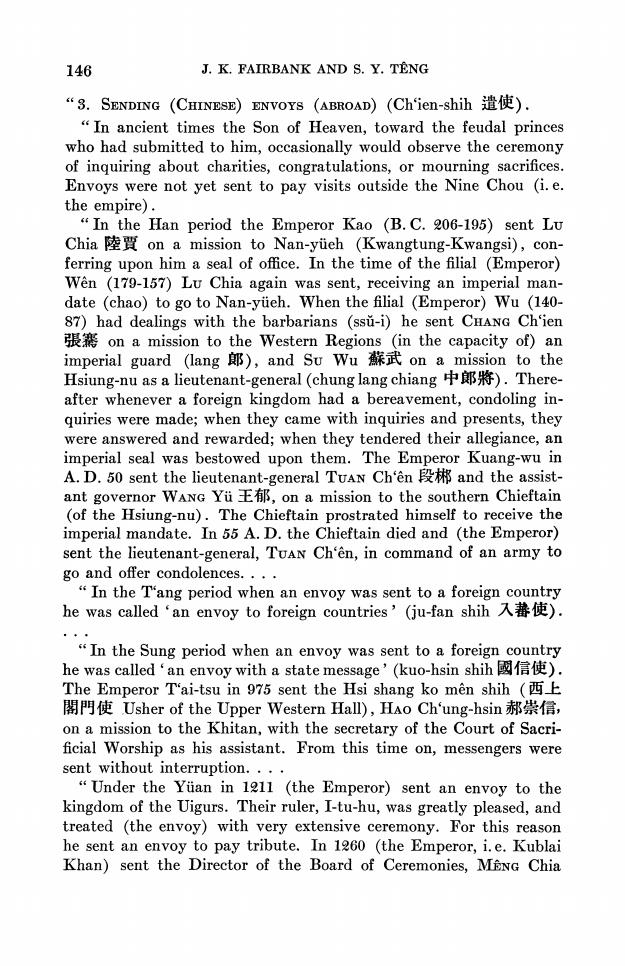正在加载图片...

146 J.K.FAIRBANK AND S.Y.TENG “3.SENDING(CHINESE)NVOYS(ABROAD)(Ch'ien-shih遣使). "In ancient times the Son of Heaven,toward the feudal princes who had submitted to him,occasionally would observe the ceremony of inquiring about charities,congratulations,or mourning sacrifices. Envoys were not yet sent to pay visits outside the Nine Chou (i.e. the empire). "In the Han period the Emperor Kao (B.C.206-195)sent Lu Chia on a mission to Nan-yuieh (Kwangtung-Kwangsi),con- ferring upon him a seal of office.In the time of the filial (Emperor) Wen (179-157)Lu Chia again was sent,receiving an imperial man- date (chao)to go to Nan-yuieh.When the filial (Emperor)Wu (140- 87)had dealings with the barbarians (ssu-i)he sent CHANG Ch'ien on a mission to the Western Regions (in the capacity of)an imperial guard(Iang郎),and Sv Wu蘇武on a mission to the Hsiung-nu as a lieutenant-general(chung lang chiang中郎將).There- after whenever a foreign kingdom had a bereavement,condoling in- quiries were made;when they came with inquiries and presents,they were answered and rewarded;when they tendered their allegiance,an imperial seal was bestowed upon them.The Emperor Kuang-wu in A.D.50 sent the lieutenant-general TUAN Ch'en and the assist- ant governor WANG Yii王郁,on a mission to the southern Chieftain (of the Hsiung-nu).The Chieftain prostrated himself to receive the imperial mandate.In 55 A.D.the Chieftain died and (the Emperor) sent the lieutenant-general,TUAN Ch'en,in command of an army to go and offer condolences.... "In the T'ang period when an envoy was sent to a foreign country he was called‘an envoy to foreign countries'(ju-fan shih入使). “In the ung period when a envoywasen tofor信使y he was called‘an envoy with a state message'(kuo-hsin shih國信使). The Emperor T'ai-tsu in 975 sent the Hsi shang ko men shih( 閣門使Usher of the Upper Western Hall),HAo Ch'ung-hsin郝崇信, on a mission to the Khitan,with the secretary of the Court of Sacri- ficial Worship as his assistant.From this time on,messengers were sent without interruption.... "Under the Yiian in 1211 (the Emperor)sent an envoy to the kingdom of the Uigurs.Their ruler,I-tu-hu,was greatly pleased,and treated (the envoy)with very extensive ceremony.For this reason he sent an envoy to pay tribute.In 1260 (the Emperor,i.e.Kublai Khan)sent the Director of the Board of Ceremonies,MENG Chia146 J. K. FAIRBANK AND S. Y. TPNG ". SENDING (CHINESE) ENVOYS (ABROAD) (Ch'ien-shih . "In ancient times the Son of Heaven, toward the feudal princes who had submitted to him, occasionally would observe the ceremony of inquiring about charities, congratulations, or mourning sacrifices. Envoys were not yet sent to pay visits outside the Nine Chou (i. e. the empire). " In the Han period the Emperor Kao (B. C. 206-195) sent Lu Chia MM on a mission to Nan-yiieh (Kwangtung-Kwangsi), conferring upon him a seal of office. In the time of the filial (Emperor) Wen (179-157) Lu Chia again was sent, receiving an imperial mandate (chao) to go to Nan-yiieh. When the filial (Emperor) Wu (140- 87) had dealings with the barbarians (ssui-i) he sent CHANG Ch'ien &k*, on a mission to the Western Regions (in the capacity of) an imperial guard (lang MS), and Su Wu SA on a mission to the Hsiung-nu as a lieutenant-general (chung lang chiang +P J W) . Thereafter whenever a foreign kingdom had a bereavement, condoling inquiries were made; when they came with inquiries and presents, they were answered and rewarded; when they tendered their allegiance, an imperial seal was bestowed upon them. The Emperor Kuang-wu in A. D. 50 sent the lieutenant-general TUAN Ch'en R*$ and the assistant governor WANG YU TEVJl, on a mission to the southern Chieftain (of the Hsiung-nu). The Chieftain prostrated himself to receive the imperial mandate. In 55 A. D. the Chieftain died and (the Emperor) sent the lieutenant-general, TUAN Ch'en, in command of an army to go and offer condolences.... " In the T'ang period when an envoy was sent to a foreign country he was called 'an envoy to foreign countries' (ju-fan shih A#1X). * . @ "In the Sung period when an envoy was sent to a foreign country he was called 'an envoy with a state message' (kuo-hsin shih IM{C{M). The Emperor T'ai-tsu in 975 sent the Hsi shang ko men shih ( i?E rAPJH{ Usher of the Upper Western Hall), HAO Ch'ung-hsin 4IMA*{ on a mission to the Khitan, with the secretary of the Court of Sacrificial Worship as his assistant. From this time on, messengers were sent without interruption. ... " Under the Yuan in 1211 (the Emperor) sent an envoy to the kingdom of the Uigurs. Their ruler, J-tu-hu, was greatly pleased, and treated (the envoy) with very extensive ceremony. For this reason he sent an envoy to pay tribute. In 1260 (the Emperor, i. e. Kublai Khan) sent the Director of the Board of Ceremonies, MENG Chia